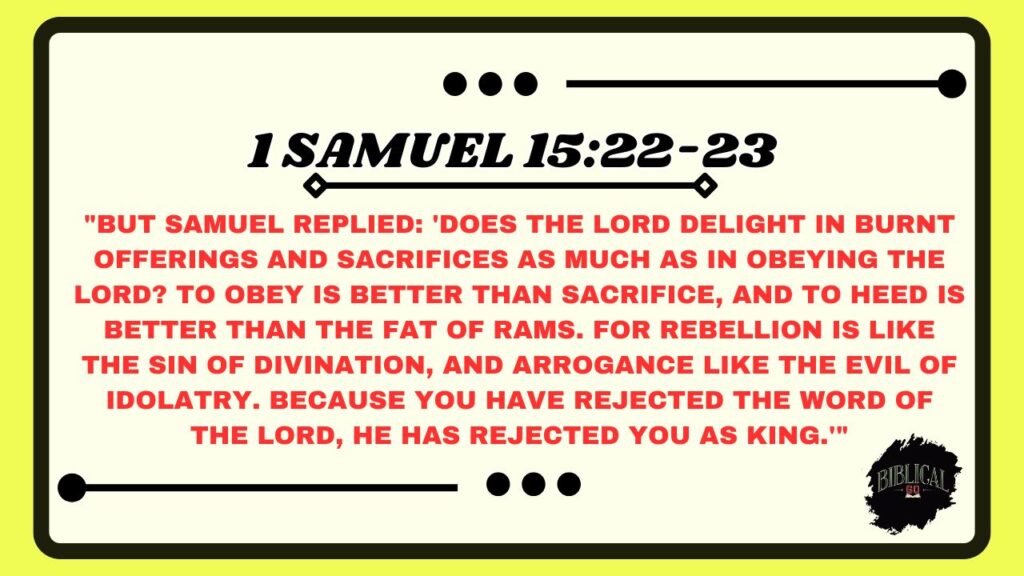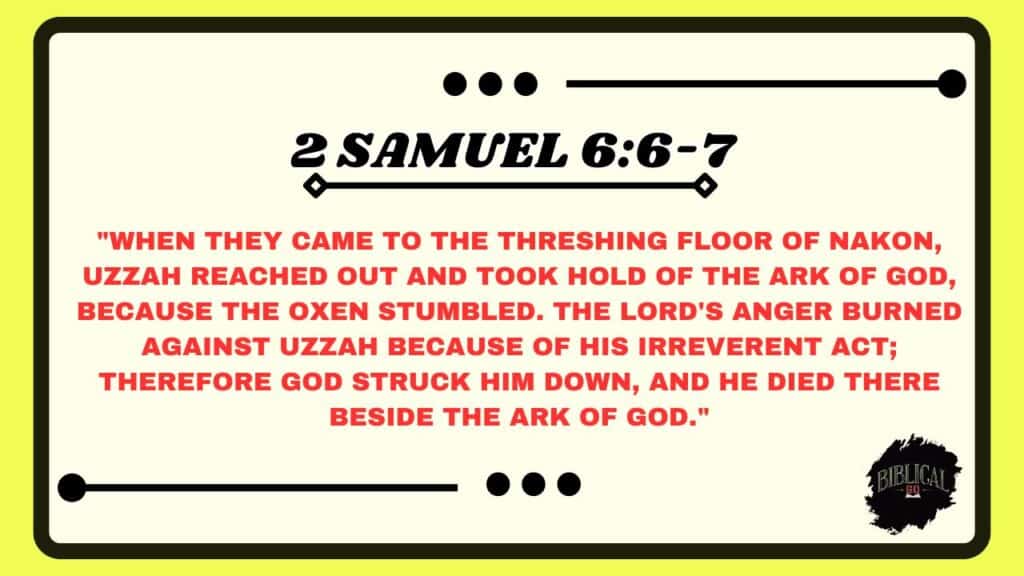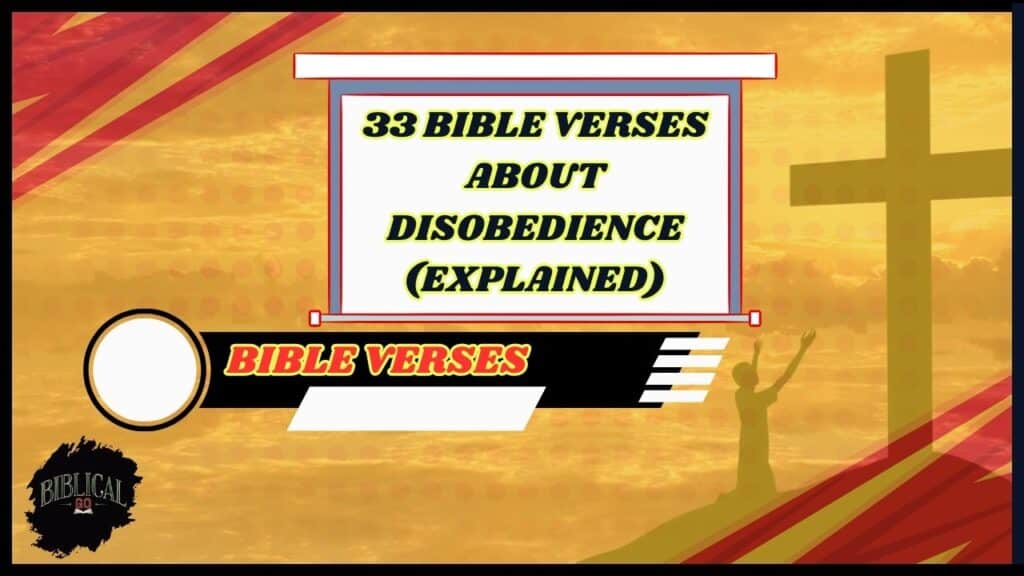Bible Verses About Disobedience: Disobedience is a common thread throughout the Bible, from the very first act of defiance in the Garden of Eden to the repeated rebellions of God’s people throughout history.
The scriptures provide profound insights into the nature of disobedience, its consequences, and God’s response to our waywardness.
When we disobey God, we’re essentially saying that we know better than our Creator. This prideful stance separates us from God’s best plans for our lives. Yet, the Bible doesn’t just condemn disobedience it also offers paths to reconciliation and restoration.
In this article, we’ll explore 33 key verses that highlight different aspects of disobedience, helping us understand why obedience matters to God and how we can return to His ways when we’ve strayed.
Also Read: 40 Important Bible Verses About Casting Out Demons
The Nature and Origin of Disobedience
Disobedience began in the earliest chapters of human history. These verses help us understand its root causes and how it affects our relationship with God.
1. Genesis 3:6-7 – “When the woman saw that the fruit of the tree was good for food and pleasing to the eye, and also desirable for gaining wisdom, she took some and ate it. She also gave some to her husband, who was with her, and he ate it. Then the eyes of both of them were opened, and they realized they were naked; so they sewed fig leaves together and made coverings for themselves.”

The first act of disobedience altered humanity’s relationship with God forever. Eve’s choice illustrates how disobedience often stems from desiring things that seem good but contradict God’s instructions. This moment teaches us to question our motives when tempted to disobey.
2. Romans 5:19 – “For just as through the disobedience of the one man the many were made sinners, so also through the obedience of the one man the many will be made righteous.”
Adam’s disobedience brought sin into the world, affecting all humanity. Paul contrasts this with Christ’s perfect obedience, showing that our individual choices have far-reaching consequences. This verse reminds us that our actions impact not just ourselves but others around us.
3. James 1:14-15 – “But each person is tempted when they are dragged away by their own evil desire and enticed. Then, after desire has conceived, it gives birth to sin; and sin, when it is full-grown, gives birth to death.”
Disobedience follows a predictable pattern, beginning with internal desire. James traces the progression from temptation to spiritual death, showing disobedience’s destructive trajectory. Understanding this process helps us identify and interrupt the cycle of temptation before it leads to disobedience.
4. Ephesians 2:1-2 – “As for you, you were dead in your transgressions and sins, in which you used to live when you followed the ways of this world and of the ruler of the kingdom of the air, the spirit who is now at work in those who are disobedient.”
Paul describes disobedience as a spiritual state of death. The verse reveals that disobedience connects us to worldly values and spiritual forces opposing God. This sobering perspective encourages us to recognize the serious spiritual implications of our disobedient choices.
5. Proverbs 14:12 – “There is a way that appears to be right, but in the end it leads to death.”
Our human reasoning can justify disobedience, but the end result is spiritual damage. This proverb warns against trusting our own judgment above God’s commands. When tempted to disobey, we should question whether we’re being led by God’s wisdom or our limited understanding.
6. Isaiah 30:1 – “Woe to the obstinate children,” declares the LORD, “to those who carry out plans that are not mine, forming an alliance, but not by my Spirit, heaping sin upon sin.”
Making plans without seeking God’s guidance leads to compounded disobedience. Isaiah warns against self-reliance and acting independently of God’s Spirit. This verse calls us to regularly submit our plans to God rather than acting autonomously.
The Consequences of Disobedience
Scripture clearly outlines what happens when we choose to disobey God. These verses reveal the spiritual, relational, and practical outcomes of rebellion.
7. Deuteronomy 28:15 – “However, if you do not obey the LORD your God and do not carefully follow all his commands and decrees I am giving you today, all these curses will come on you and overtake you.”
Disobedience to God’s commands brings negative consequences. Moses warned Israel that blessing and cursing were tied to their obedience. This reminds us that God’s commands are given for our benefit, and disregarding them invites difficulty into our lives.
8. Galatians 6:7-8 – “Do not be deceived: God cannot be mocked. A man reaps what he sows. Whoever sows to please their flesh, from the flesh will reap destruction; whoever sows to please the Spirit, from the Spirit will reap eternal life.”
Disobedience follows the principle of sowing and reaping. Paul emphasizes that our choices have natural consequences that can’t be escaped. When we choose to disobey, we’re essentially planting seeds that will grow into painful outcomes.
9. Proverbs 13:15 – “Good judgment wins favor, but the way of the unfaithful leads to their destruction.”
Unfaithfulness to God’s ways creates a difficult path. This proverb contrasts the smooth road of wisdom with the rough journey of disobedience. Applying this verse means recognizing that obedience, while sometimes challenging initially, ultimately makes life easier.
10. 1 Samuel 15:22-23 – “But Samuel replied: ‘Does the LORD delight in burnt offerings and sacrifices as much as in obeying the LORD? To obey is better than sacrifice, and to heed is better than the fat of rams. For rebellion is like the sin of divination, and arrogance like the evil of idolatry. Because you have rejected the word of the LORD, he has rejected you as king.'”

Saul’s partial obedience was considered rebellion by God. Samuel equates disobedience with serious spiritual offenses like witchcraft and idolatry. This stark comparison shows that God values complete obedience over religious rituals or partial compliance.
11. Jeremiah 5:25 – “Your wrongdoings have kept these away; your sins have deprived you of good.”
Sin creates a barrier that blocks God’s blessings. Jeremiah explains that disobedience prevents the good things God intends for us. This verse helps us understand that when we experience a lack of God’s blessing, we should examine our obedience.
12. Isaiah 59:2 – “But your iniquities have separated you from your God; your sins have hidden his face from you, so that he will not hear.”
Disobedience creates relational distance from God. Isaiah explains that sin affects our communion with God and our prayers. When we feel distant from God, this verse encourages us to consider whether disobedience might be creating that separation.
13. Romans 2:8 – “But for those who are self-seeking and who reject the truth and follow evil, there will be wrath and anger.”
Persistent disobedience brings divine judgment. Paul warns that rejecting God’s truth leads to experiencing His righteous anger. This verse reminds us that while God is patient, continued rebellion will eventually face His justice.
Also Read: 37 Important Bible Verses About Sports (Explained)
God’s Response to Disobedience
How does God react when we disobey? These verses reveal His heart toward the disobedient and His desire for restoration.
14. 2 Chronicles 7:14 – “If my people, who are called by my name, will humble themselves and pray and seek my face and turn from their wicked ways, then I will hear from heaven, and I will forgive their sin and will heal their land.”
God offers a path to restoration through repentance. This verse outlines the steps to reconciliation: humility, prayer, seeking God, and turning from sin. When we’ve been disobedient, this provides a clear roadmap back to right relationship with God.
15. Psalm 32:1-2 – “Blessed is the one whose transgressions are forgiven, whose sins are covered. Blessed is the one whose sin the LORD does not count against them and in whose spirit is no deceit.”
God extends forgiveness to the repentant. David celebrates the joy of being forgiven after his disobedience. This teaches us that honest confession leads to the blessing of restoration rather than the burden of guilt.
16. Hosea 14:1-2 – “Return, Israel, to the LORD your God. Your sins have been your downfall! Take words with you and return to the LORD. Say to him: ‘Forgive all our sins and receive us graciously, that we may offer the fruit of our lips.'”
God invites the disobedient to return to Him. Hosea provides a template for repentance that acknowledges sin’s damage. This passage reminds us that God always leaves the door open for our return, no matter how far we’ve strayed.
17. Luke 15:20-24 – “But while he was still a long way off, his father saw him and was filled with compassion for him; he ran to his son, threw his arms around him and kissed him… ‘For this son of mine was dead and is alive again; he was lost and is found.’ So they began to celebrate.”
The parable of the prodigal son reveals God’s heart toward the returning disobedient. Jesus portrays the father’s eager welcome and celebration when his wayward son returns. This story assures us that God doesn’t merely tolerate our return He celebrates it.
18. Ezekiel 33:11 – “Say to them, ‘As surely as I live, declares the Sovereign LORD, I take no pleasure in the death of the wicked, but rather that they turn from their ways and live. Turn! Turn from your evil ways! Why will you die, people of Israel?'”

God desires repentance rather than punishment. Ezekiel reveals God’s heart to rescue rather than condemn the disobedient. This verse shows us that God’s warnings about disobedience come from love, not a desire to harm us.
19. Revelation 3:19 – “Those whom I love I rebuke and discipline. So be earnest and repent.”
God’s discipline of the disobedient demonstrates His love. Jesus explains that correction comes from care, not indifference. This helps us reframe our perspective on God’s discipline as a sign of His commitment to our growth rather than His anger.
Also Read: 36 Important Bible Verses About Clarity (Explained)
The Call to Obedience
God doesn’t just warn against disobedience He actively calls us to a life of obedience. These verses highlight why obedience matters and how we can live it out.
20. John 14:15 – “If you love me, keep my commands.”
Obedience is the practical expression of love for God. Jesus establishes a direct connection between love and obedience. This simple verse reminds us that our obedience isn’t just about rules it’s about relationship.
21. 1 John 5:3 – “In fact, this is love for God: to keep his commands. And his commands are not burdensome.”
God’s commands are given for our benefit, not to burden us. John explains that obedience and love are intertwined. This verse helps us see God’s commands as expressions of His love rather than arbitrary restrictions.
22. James 1:22 – “Do not merely listen to the word, and so deceive yourselves. Do what it says.”
Knowledge without action is self-deception. James warns against the false security of hearing without obeying. This challenges us to examine whether we’re merely accumulating biblical knowledge or actually living it out.
23. Philippians 2:8 – “And being found in appearance as a man, he humbled himself by becoming obedient to death even death on a cross!”
Christ’s obedience, even to death, provides our ultimate example. Paul highlights Jesus’ extreme obedience as our model. When obedience feels difficult, we can draw strength from remembering Christ’s perfect submission.
24. Deuteronomy 11:26-28 – “See, I am setting before you today a blessing and a curse the blessing if you obey the commands of the LORD your God that I am giving you today; the curse if you disobey the commands of the LORD your God and turn from the way that I command you today by following other gods, which you have not known.”
God presents obedience as a choice with clear consequences. Moses laid out the outcomes of obedience and disobedience. This verse reminds us that we actively choose our path and its results every day.
25. Joshua 24:15 – “But if serving the LORD seems undesirable to you, then choose for yourselves this day whom you will serve, whether the gods your ancestors served beyond the Euphrates, or the gods of the Amorites, in whose land you are living. But as for me and my household, we will serve the LORD.”
Joshua challenges the people to make a clear choice about obedience. He frames obedience as a matter of who we will serve. This verse encourages us to make intentional, public commitments to obey God regardless of what others choose.
26. Acts 5:29 – “Peter and the other apostles replied: ‘We must obey God rather than human beings!'”
When human authority conflicts with God’s commands, God’s authority takes precedence. The apostles demonstrated courageous obedience despite opposition. This verse gives us guidance for navigating situations where obedience to God may create conflict with human expectations.
Also Read: 36 Important Bible Verses About Anointing (Explained)
Disobedience in Biblical History
The Bible contains many examples of disobedience and its outcomes. These verses provide instructive case studies for our own lives.
27. Jonah 1:1-3 – “The word of the LORD came to Jonah son of Amittai: ‘Go to the great city of Nineveh and preach against it, because its wickedness has come up before me.’ But Jonah ran away from the LORD and headed for Tarshish.”
Jonah’s disobedience led to a series of difficulties. His story shows how running from God’s call creates problems. We learn from Jonah that disobedience doesn’t ultimately change God’s plans but makes our journey more challenging.
28. Numbers 20:11-12 – “Then Moses raised his arm and struck the rock twice with his staff. Water gushed out, and the community and their livestock drank. But the LORD said to Moses and Aaron, ‘Because you did not trust in me enough to honor me as holy in the sight of the Israelites, you will not bring this community into the land I give them.'”
Moses’ disobedience had serious consequences despite his leadership role. He struck the rock instead of speaking to it as God commanded. This teaches us that no one is exempt from the consequences of disobedience, regardless of their spiritual position.
29. 1 Kings 13:20-22 – “While they were sitting at the table, the word of the LORD came to the old prophet who had brought him back. He cried out to the man of God who had come from Judah, ‘This is what the LORD says: “You have defied the word of the LORD and have not kept the command the LORD your God gave you… your body will not be buried in the tomb of your ancestors.”‘”
The young prophet’s disobedience, even when deceived, still had consequences. Though tricked by another prophet, he was still responsible for his actions. This story warns us against letting others’ influence lead us away from what we know God has told us.
30. 2 Samuel 6:6-7 – “When they came to the threshing floor of Nakon, Uzzah reached out and took hold of the ark of God, because the oxen stumbled. The LORD’s anger burned against Uzzah because of his irreverent act; therefore God struck him down, and he died there beside the ark of God.”

Uzzah’s well-intentioned disobedience had severe consequences. He touched the ark despite God’s clear instructions against it. This teaches us that even good intentions don’t justify disobeying God’s specific commands.
31. Judges 2:11-15 – “Then the Israelites did evil in the eyes of the LORD and served the Baals… In his anger against Israel the LORD gave them into the hands of raiders who plundered them. He sold them into the hands of their enemies all around, whom they were no longer able to resist.”
Israel’s repeated cycle of disobedience led to national consequences. Judges records how rebellion resulted in oppression. This historical pattern reminds us that collective disobedience affects not just individuals but entire communities.
32. Exodus 32:7-10 – “Then the LORD said to Moses, ‘Go down, because your people, whom you brought up out of Egypt, have become corrupt. They have been quick to turn away from what I commanded them and have made themselves an idol cast in the shape of a calf.'”
Israel’s golden calf incident showed how quickly disobedience can arise. Moses was still on the mountain receiving God’s commands when the people turned to idolatry. This story warns us against impatience and the swift departure from God’s ways that can follow.
33. Acts 5:1-11 – “Now a man named Ananias, together with his wife Sapphira, also sold a piece of property. With his wife’s full knowledge he kept back part of the money for himself, but brought the rest and put it at the apostles’ feet… Then Peter said, ‘Ananias, how is it that Satan has so filled your heart that you have lied to the Holy Spirit?’… When Ananias heard this, he fell down and died.”
Ananias and Sapphira’s deception revealed the seriousness of dishonesty within the church. Their story demonstrates how God views integrity in the community of believers. This sobering account teaches us that God values truth and transparency in our faith communities.
Also Read: 39 Powerful Bible Verses About Commitment
Conclusion: Bible Verses About Disobedience
The Bible’s teachings on disobedience provide both warning and hope. Through these verses, we see that God takes disobedience seriously because it damages our relationship with Him and leads to harmful consequences. Yet we also discover that God’s heart is always toward restoration and renewal.
When we disobey, God doesn’t abandon us. Instead, He lovingly calls us back to His ways. The story of scripture is one of a Father pursuing His wayward children, offering forgiveness and a fresh start.
As we reflect on these verses, may we be encouraged to examine our own lives, identifying areas where we’ve strayed from God’s path. Let’s remember that obedience isn’t about earning God’s love but responding to it. Through Christ, we have the power to walk in obedience and experience the freedom and blessing that comes with following God’s ways.
Bonus: Practical Applications for Understanding Disobedience
- Self-Examination Practice: Set aside time weekly to reflect on these verses and ask the Holy Spirit to reveal any areas of disobedience in your life.
- Accountability Partnership: Find a trusted friend who can help you stay accountable to obedience in challenging areas.
- Memory Verses: Choose 2-3 verses from this list that particularly speak to you and memorize them to recall when tempted.
- Bible Study: Use these verses as the foundation for a small group study on obedience and disobedience.
- Journaling Prompts: Write about times when you’ve experienced the consequences of disobedience and what you learned.
- Prayer Guide: Create a prayer focusing on each aspect of disobedience: confession, repentance, and commitment to obedience.
- Family Discussion: Use age-appropriate examples from these verses to discuss obedience with children.
Frequently Asked Questions
Q: Does God still punish disobedience today?
A: While God doesn’t typically punish disobedience with immediate physical consequences as seen in some Old Testament examples, the principle of natural consequences remains. Disobedience often leads to its own negative outcomes. Additionally, as loving children of God, we may experience His discipline (Hebrews 12:5-11) which is always intended for our growth and restoration.
Q: If I’ve been disobedient, how can I restore my relationship with God?
A: The path back to God always involves honest confession, genuine repentance, and a commitment to walk in obedience going forward. 1 John 1:9 promises that “If we confess our sins, he is faithful and just and will forgive us our sins and purify us from all unrighteousness.”
Q: How can I distinguish between God’s commands and human traditions?
A: God’s commands are clearly revealed in scripture. When uncertain, ask: Does this align with the whole counsel of God’s Word? Is it consistent with the character of Christ? Does it promote love for God and others? The Holy Spirit also guides believers in discernment.
Q: Why does God allow disobedience if He knows it will hurt us?
A: God values our free will and genuine love, which requires the possibility of disobedience. Rather than creating robots who automatically obey, God desires children who choose to follow Him out of love and trust.
Q: How should I respond to others’ disobedience, especially in the church?
A: Scripture calls us to gentle restoration (Galatians 6:1), speaking truth in love (Ephesians 4:15), and addressing serious sin within the church community (Matthew 18:15-17). Our goal should always be reconciliation and growth, not judgment or condemnation.
Read more knowledgeable blogs on Biblical Go

Piper McMillan is a devoted writer and Bible enthusiast, offering insightful guides on Bible verses. Her blog provides practical interpretations and reflections, helping readers deepen their faith and understanding of Scripture through accessible and inspiring content.



